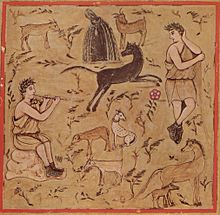
Back زراعيات Arabic Xórxiques AST Георгики Bulgarian Geòrgiques Catalan Georgica (Zpěvy rolnické) Czech Georgica German Γεωργικά Greek Georgiko Esperanto Geórgicas Spanish Georgica Estonian

The Georgics (/ˈdʒɔːrdʒɪks/ JOR-jiks; Latin: Georgica [ɡeˈoːrɡɪka]) is a poem by Latin poet Virgil, likely published in 29 BCE.[1] As the name suggests (from the Greek word γεωργικά, geōrgiká, i.e. "agricultural (things)")[2] the subject of the poem is agriculture; but far from being an example of peaceful rural poetry, it is a work characterized by tensions in both theme and purpose.
The Georgics is considered Virgil's second major work, following his Eclogues and preceding the Aeneid. The poem draws on a variety of prior sources and has influenced many later authors from antiquity to the present.[3]
- ^ Thomas, Richard F. Georgics Vol.I: Books I–II. Cambridge, 1988. I.
- ^ γεωργικά. Liddell, Henry George; Scott, Robert; A Greek–English Lexicon at the Perseus Project
- ^ Tonkin, Boyd (January 4, 2010). "Georgics, By Virgil, translated by Kimberly Johnson". The Independent. Retrieved December 6, 2016.